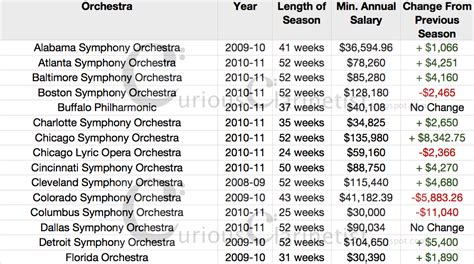Professional musicians in orchestras are highly skilled individuals who dedicate their lives to honing their craft and contributing to the beauty of music. Their salaries are a reflection of their talent, training, and experience. This article provides a comprehensive overview of orchestra musician salaries, including factors that influence pay and common misconceptions about compensation.

Factors That Influence Orchestra Musician Salary
Several factors contribute to the variation in orchestra musician salaries, including:
- Location: The geographic location of an orchestra can significantly impact salaries. Orchestras in major metropolitan areas tend to offer higher pay than those in smaller cities or rural areas.
- Size and Prestige: The size and prestige of an orchestra also play a role in determining salaries. Larger and more prestigious orchestras typically offer higher compensation to attract and retain top-tier musicians.
- Tenure: Musicians who have been with an orchestra for a longer period are generally paid more than their newer counterparts. Seniority is often recognized and rewarded with increased compensation.
- Union Status: Many orchestras are unionized, which can influence salaries. Unions negotiate contracts that establish minimum wage rates, benefits packages, and working conditions.
- Education and Training: Musicians with advanced degrees and specialized training may command higher salaries. Excellent musical skills, a strong educational background, and relevant performance experience are all highly valued by orchestras.
Salary Ranges
According to the American Federation of Musicians (AFM), the median annual salary for orchestra musicians in the United States in 2020 was $64,010. However, salaries can vary widely depending on the factors mentioned above.
- Entry-Level Musicians: Musicians just starting their careers may earn salaries in the range of $30,000 to $45,000 per year.
- Mid-Career Musicians: Musicians with several years of experience can earn between $50,000 and $80,000 annually.
- Senior Musicians: Experienced musicians with tenure and leadership positions may earn salaries exceeding $100,000 per year.
Benefits of Being an Orchestra Musician
In addition to their salaries, orchestra musicians often receive a range of benefits, including:
- Health Insurance: Most orchestras provide health insurance coverage for their musicians and their families.
- Paid Time Off: Orchestra musicians typically receive paid time off for rehearsals, performances, and vacations.
- Retirement Plans: Many orchestras offer retirement plans, such as 401(k) plans, to help musicians save for their future.
- Professional Development Opportunities: Orchestras often provide professional development opportunities for their musicians, such as workshops, master classes, and performance opportunities.
Common Mistakes to Avoid
When considering an orchestra musician career, it is important to avoid common misconceptions about compensation:
- Orchestra Music is a Low-Paying Profession: While it is true that some orchestra musicians may earn modest salaries, this is not a universal truth. Many orchestras offer competitive compensation packages that allow musicians to earn a comfortable living.
- Only the Most Talented Musicians Make Good Money: While exceptional talent is certainly an advantage, it is not the only factor that determines salary. Experience, dedication, and a strong work ethic are all equally important.
- Salaries are Stagnant: Orchestra musician salaries have steadily increased over the years. Musicians who are willing to negotiate and advocate for their worth can see their salaries grow over time.
Why Orchestra Musicians Matter
Orchestra musicians play a vital role in society, bringing beauty and inspiration to audiences through their performances. They contribute to the cultural fabric of their communities and teach us about the power of collaboration and teamwork. Without orchestra musicians, the world would be a much quieter and less vibrant place.
Conclusion
The salary of an orchestra musician is a reflection of their skills, training, and experience. While salaries can vary depending on various factors, orchestra musicians can expect to earn a comfortable living and enjoy a range of benefits. By understanding the factors that influence salaries and avoiding common misconceptions, aspiring orchestra musicians can set themselves up for a successful and rewarding career.
Table 1: Orchestra Musician Salary Ranges
| Experience Level | Salary Range |
|---|---|
| Entry-Level | $30,000-$45,000 |
| Mid-Career | $50,000-$80,000 |
| Senior | Over $100,000 |
Table 2: Benefits of Being an Orchestra Musician
| Benefit | Description |
|---|---|
| Health Insurance | Coverage for health expenses for musicians and their families |
| Paid Time Off | Time off for rehearsals, performances, and vacations |
| Retirement Plans | Retirement savings plans to help musicians save for the future |
| Professional Development Opportunities | Workshops, master classes, and performance opportunities to enhance musical skills |
Table 3: Factors That Influence Orchestra Musician Salary
| Factor | Description |
|---|---|
| Location | Geographic location of the orchestra |
| Size and Prestige | Size and reputation of the orchestra |
| Tenure | Length of time the musician has been with the orchestra |
| Union Status | Membership in a musicians’ union |
| Education and Training | Degree and performance experience |
Table 4: Common Mistakes to Avoid When Considering an Orchestra Musician Career
| Misconception | Truth |
|---|---|
| Orchestra Music is a Low-Paying Profession | Musicians can earn comfortable salaries and benefits |
| Only the Most Talented Musicians Make Good Money | Hard work, dedication, and experience are also important |
| Salaries are Stagnant | Musician salaries have increased over time |
